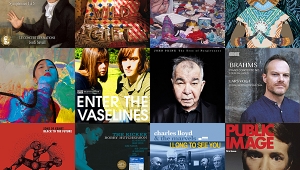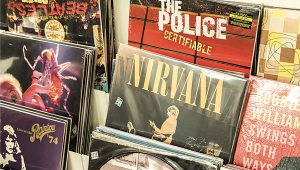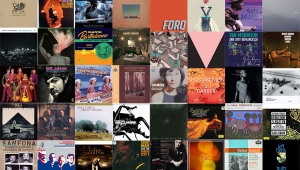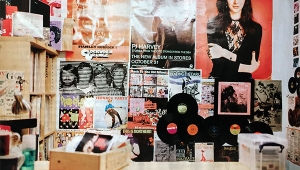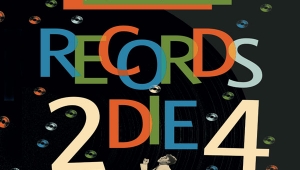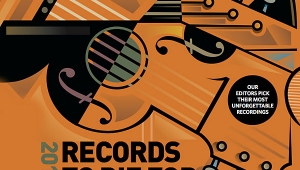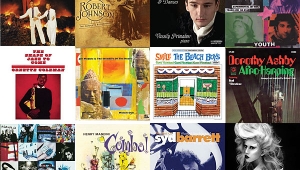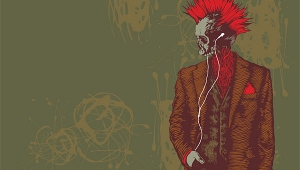| Columns Retired Columns & Blogs |
1994 Records To Die For Page 6
Alvin Gold
P.D.Q. BACH: Portrait of P.D.Q. Bach
Prof. Peter Schickele, conductor; New York Pickup Ensemble, many others
Vanguard VSD 79399 (LP). Seymour Solomon, Peter Schickele, prods.; Robert Lurie, eng. AAA. TT: 42:46
The music, of course, is a spoof; but the selection here is in deadly earnest. Prof. Schickele's New York Pickup Ensemble is as rough and ready as the name suggests, and the recording has clearly been done cheaply---this really is the beauty of the enterprise. It may not have the widest frequency range, and distortion is high enough to make self-respecting digital engineers cringe, yet when the quirky Echo Sonata for Two Unfriendly Groups of Instruments, in ping-pong stereo, trundles into view, you realize with a start that, for once, you're hearing it as it really is.
RY COODER: Crossroads: Original Soundtrack
Warner Bros. 25399-2 (CD only). Ry Cooder, prod.; Tony Chiappa, Dave Ahlert, Judy Last, engs. AAD. TT: 37:45
Almost any of Ry Cooder's recorded catalog would have done. My first choices, Jazz and Chicken Skin Music, have been nominated in previous years, but the Crossroads soundtrack is in the same class. As always with Ry Cooder, the directness and uncontrived nature of his music-making and the economy of the arrangements make this album so special. The standout track is the wonderful version of J.B. Lenoir's "Down in Mississippi," which starts off acappella and was recorded for the album only (it doesn't appear in the film). Sound quality is in the "being there" class.
DEBUSSY: Le Martyre de Saint Sébastien
Michael Tilson Thomas, LSO; Stephen Westrop, LSO Chorus; Ann Murray, Nathalie Stutzmann, Sylvia McNair, soloists; Leslie Caron, narrator
Sony SK 48240 (CD only). Andreas Neubronner, prod.; Marcus Herzog, eng. DDD. TT: 66:23
I stumbled across this one while looking into Sony's Super Bit Mapping technology, which happens to suit this work perfectly. Le Martyre takes the form of a rapt, rather beautiful, and economically written oratorio with some theatrical overtones---eg, a narrator. Like other SBM recordings, it only really comes to life when the volume is set at a level similar to a live performance heard from reasonably close quarters---then the recording has startling vividness and transparency, and joins the select company of those that send a shiver down the spine.
LOCATELLI: Introduttioni Teatrali
Thomas Hengelbrock, Freiburger Barockorchester
Deutsche Harmonia Mundi 05472 77207 2 (CD only). Franccois Eckert, recording supervisor, editor. DDD. TT: 66:18
Locatelli's music is comparable with Purcell's in the sophistication of its late-Baroque writing. This stunning disc is played by an original-instrument ensemble which understands that authenticity does not stop with the instruments themselves. Their playing, while fabulously disciplined, is rumbustious and spirited; this is no dry, cerebral enterprise. The recording has tremendous presence and range, and is superimposed on a strong and believable acoustic (Maria Minor Kirche, Utrecht) which adds atmosphere and weight without obscuring detail. State-of-the-art music, musicianship, and sonics. Don't be put off by Locatelli's low public profile.
TOM WAITS: Swordfishtrombones
Island 422-842 469-2 (CD only). Tom Waits, prod. AAD. TT: 41:49
This is a much-needed counterweight to the self-importance of much modern rock. What's more, Tom Waits's ability to switch moods, from the schmaltzy sentimentality of "Soldier's Things" through the black humor of "Frank's Wild Years" to the banal violence of "Underground," is unmatched. A true original, Waits is served here by unobtrusively excellent engineering that doesn't cramp his sound or style. What results is music-making so tactile that, at times, it's like being hit rhythmically over the head with a mallet. Loud, dirty, unexpectedly tender in places---and gloriously unswitchoffable.
Larry Greenhill
PATRIOT GAMES: Original Soundtrack
James Horner, composer; Maggie Boyle, Clannad
Milan 07863 66051-2 (CD only). James Horner, prod.; Shawn Murphy, eng. AAD. TT: 46:54
This album is not like most movie scores---the tracks are not repetitious, and it has a lot more than endless trite variations of the movie's theme music. Actually, it's easy to miss the movie's thin, fluttering flute motif, overpowered as it is by thunderous percussion and the best bass I've heard on the CD medium that's actually music. "The Hit" proves this CD's worth: pounding bass drum, chimes, ascending tempo, and a raspy pipe instrument that immediately translates into suffocating dread and fear. This tachycardiac pace is offset by "Electronic Battlefield," the beautiful musical backdrop to the silent African desert battle that, in the film, is viewed via satellite at CIA headquarters. Horner's soft, lyrical, but ultimately eerie composing here more than meets his goal---gut-tightening suspense and explosive percussion. The music is riveting, driving, and pulsing. My nominee for this year's orchestral powerhouse.
WILLIE NELSON: Across the Borderline
Columbia CK 52752 (CD only). Don Was, Paul Simon, prods.; Rik Pekkonen, eng.
This album's song-writing---Dylan, Paul Simon, Lyle Lovett, T.S. Bruton, and Willie Nelson---is definitely first-rate. The performances also set standards. Nelson takes a standard C&W song, Bruton's "Getting Over You," and turns it to his advantage, harmonizing with Bonnie Raitt. Peter Gabriel's "Don't Give Up" develops real power in its contrast of Sinead O'Connor's frail, thready soprano with Nelson's warm baritone. Nelson's "Graceland" (with Paul Simon on acoustic guitar) has a more pulsing, rhythmic stomp than the original, but works better for Nelson's style. More in the popular vein is Dylan's "What Was it You Wanted," which uses the technique Billy Joel developed, of producing a clever song by running together clichés. The sidemen are terrific, the production is tops, the sonics are the best I've heard recently from Nelson, and the performances have me coming back again and again.
Corey Greenberg
NIRVANA: In Utero
Geffen DGCD-24607 (LP/CD). Steve Albini, prod.; Bob Ludwig, mastering. AAD. TT: 41:24
Not the Nevermind clone the teen spirits expected, and not the big fat F*** YOU the critics expected, In Utero is more substantive and satisfying than the deservedly classic Nevermind, which I deemed an R2D4 last year. The songs rock harder and say more here, but the real news for us hi-fi geeks is Steve Albini's terrific production. "Heart-Shaped Box" and "Rape Me," for example, sound clean, clear, and are something you need to hear if, like me, you lament the sorry-ass state of modern rock recording. In Utero is real alternative rock, not the thinly disguised Grunge-Lite that goes down so well with soulless young GOP Pearl Jam wimps and other pawns of corporate pop who think that fake rage=sincerity. (XVII-1)
WHITE ZOMBIE: La Sexorcisto: Devil Music Vol.1
Geffen GEFD-24460 (CD only). Andy Wallace, prod.; Howie Weinberg, mastering. DDD. TT: 57:43
Welcome to Route 666. I'd never heard of White Zombie 'til I saw their video on Beavis and Butt-head, but my twin Christlets were right on the money as usual. La Sexorcisto: Devil Music Vol.1 is killer times ten and boasts excellent sound, courtesy of Andy Wallace (the twiddler who buffed Nirvana's Nevermind to such a high sheen). The vision here is one of unflinching hardcore metallic purpleflake grunting muscle-car jackoff. "Thunder Kiss '65" and the Iggy-led "Black Sunshine" lead this pack of odes to a mythical landscape where everyone looks like Lemmy, every town is Detroit USA, grunting is the national tongue, and Russ Meyer is the benevolent dictator. "Recorded in SATAN-O-PHONIC," sez the back cover---and that's no lie. My highest recommendation---they just don't make records like this anymore. Maybe they never did.
P.D.Q. BACH: Portrait of P.D.Q. Bach
Prof. Peter Schickele, conductor; New York Pickup Ensemble, many others
Vanguard VSD 79399 (LP). Seymour Solomon, Peter Schickele, prods.; Robert Lurie, eng. AAA. TT: 42:46
The music, of course, is a spoof; but the selection here is in deadly earnest. Prof. Schickele's New York Pickup Ensemble is as rough and ready as the name suggests, and the recording has clearly been done cheaply---this really is the beauty of the enterprise. It may not have the widest frequency range, and distortion is high enough to make self-respecting digital engineers cringe, yet when the quirky Echo Sonata for Two Unfriendly Groups of Instruments, in ping-pong stereo, trundles into view, you realize with a start that, for once, you're hearing it as it really is.
RY COODER: Crossroads: Original Soundtrack
Warner Bros. 25399-2 (CD only). Ry Cooder, prod.; Tony Chiappa, Dave Ahlert, Judy Last, engs. AAD. TT: 37:45
Almost any of Ry Cooder's recorded catalog would have done. My first choices, Jazz and Chicken Skin Music, have been nominated in previous years, but the Crossroads soundtrack is in the same class. As always with Ry Cooder, the directness and uncontrived nature of his music-making and the economy of the arrangements make this album so special. The standout track is the wonderful version of J.B. Lenoir's "Down in Mississippi," which starts off acappella and was recorded for the album only (it doesn't appear in the film). Sound quality is in the "being there" class.
DEBUSSY: Le Martyre de Saint Sébastien
Michael Tilson Thomas, LSO; Stephen Westrop, LSO Chorus; Ann Murray, Nathalie Stutzmann, Sylvia McNair, soloists; Leslie Caron, narrator
Sony SK 48240 (CD only). Andreas Neubronner, prod.; Marcus Herzog, eng. DDD. TT: 66:23
I stumbled across this one while looking into Sony's Super Bit Mapping technology, which happens to suit this work perfectly. Le Martyre takes the form of a rapt, rather beautiful, and economically written oratorio with some theatrical overtones---eg, a narrator. Like other SBM recordings, it only really comes to life when the volume is set at a level similar to a live performance heard from reasonably close quarters---then the recording has startling vividness and transparency, and joins the select company of those that send a shiver down the spine.
LOCATELLI: Introduttioni Teatrali
Thomas Hengelbrock, Freiburger Barockorchester
Deutsche Harmonia Mundi 05472 77207 2 (CD only). Franccois Eckert, recording supervisor, editor. DDD. TT: 66:18
Locatelli's music is comparable with Purcell's in the sophistication of its late-Baroque writing. This stunning disc is played by an original-instrument ensemble which understands that authenticity does not stop with the instruments themselves. Their playing, while fabulously disciplined, is rumbustious and spirited; this is no dry, cerebral enterprise. The recording has tremendous presence and range, and is superimposed on a strong and believable acoustic (Maria Minor Kirche, Utrecht) which adds atmosphere and weight without obscuring detail. State-of-the-art music, musicianship, and sonics. Don't be put off by Locatelli's low public profile.
TOM WAITS: Swordfishtrombones
Island 422-842 469-2 (CD only). Tom Waits, prod. AAD. TT: 41:49
This is a much-needed counterweight to the self-importance of much modern rock. What's more, Tom Waits's ability to switch moods, from the schmaltzy sentimentality of "Soldier's Things" through the black humor of "Frank's Wild Years" to the banal violence of "Underground," is unmatched. A true original, Waits is served here by unobtrusively excellent engineering that doesn't cramp his sound or style. What results is music-making so tactile that, at times, it's like being hit rhythmically over the head with a mallet. Loud, dirty, unexpectedly tender in places---and gloriously unswitchoffable.
Larry Greenhill
PATRIOT GAMES: Original Soundtrack
James Horner, composer; Maggie Boyle, Clannad
Milan 07863 66051-2 (CD only). James Horner, prod.; Shawn Murphy, eng. AAD. TT: 46:54
This album is not like most movie scores---the tracks are not repetitious, and it has a lot more than endless trite variations of the movie's theme music. Actually, it's easy to miss the movie's thin, fluttering flute motif, overpowered as it is by thunderous percussion and the best bass I've heard on the CD medium that's actually music. "The Hit" proves this CD's worth: pounding bass drum, chimes, ascending tempo, and a raspy pipe instrument that immediately translates into suffocating dread and fear. This tachycardiac pace is offset by "Electronic Battlefield," the beautiful musical backdrop to the silent African desert battle that, in the film, is viewed via satellite at CIA headquarters. Horner's soft, lyrical, but ultimately eerie composing here more than meets his goal---gut-tightening suspense and explosive percussion. The music is riveting, driving, and pulsing. My nominee for this year's orchestral powerhouse.
WILLIE NELSON: Across the Borderline
Columbia CK 52752 (CD only). Don Was, Paul Simon, prods.; Rik Pekkonen, eng.
This album's song-writing---Dylan, Paul Simon, Lyle Lovett, T.S. Bruton, and Willie Nelson---is definitely first-rate. The performances also set standards. Nelson takes a standard C&W song, Bruton's "Getting Over You," and turns it to his advantage, harmonizing with Bonnie Raitt. Peter Gabriel's "Don't Give Up" develops real power in its contrast of Sinead O'Connor's frail, thready soprano with Nelson's warm baritone. Nelson's "Graceland" (with Paul Simon on acoustic guitar) has a more pulsing, rhythmic stomp than the original, but works better for Nelson's style. More in the popular vein is Dylan's "What Was it You Wanted," which uses the technique Billy Joel developed, of producing a clever song by running together clichés. The sidemen are terrific, the production is tops, the sonics are the best I've heard recently from Nelson, and the performances have me coming back again and again.
Corey Greenberg
NIRVANA: In Utero
Geffen DGCD-24607 (LP/CD). Steve Albini, prod.; Bob Ludwig, mastering. AAD. TT: 41:24
Not the Nevermind clone the teen spirits expected, and not the big fat F*** YOU the critics expected, In Utero is more substantive and satisfying than the deservedly classic Nevermind, which I deemed an R2D4 last year. The songs rock harder and say more here, but the real news for us hi-fi geeks is Steve Albini's terrific production. "Heart-Shaped Box" and "Rape Me," for example, sound clean, clear, and are something you need to hear if, like me, you lament the sorry-ass state of modern rock recording. In Utero is real alternative rock, not the thinly disguised Grunge-Lite that goes down so well with soulless young GOP Pearl Jam wimps and other pawns of corporate pop who think that fake rage=sincerity. (XVII-1)
WHITE ZOMBIE: La Sexorcisto: Devil Music Vol.1
Geffen GEFD-24460 (CD only). Andy Wallace, prod.; Howie Weinberg, mastering. DDD. TT: 57:43
Welcome to Route 666. I'd never heard of White Zombie 'til I saw their video on Beavis and Butt-head, but my twin Christlets were right on the money as usual. La Sexorcisto: Devil Music Vol.1 is killer times ten and boasts excellent sound, courtesy of Andy Wallace (the twiddler who buffed Nirvana's Nevermind to such a high sheen). The vision here is one of unflinching hardcore metallic purpleflake grunting muscle-car jackoff. "Thunder Kiss '65" and the Iggy-led "Black Sunshine" lead this pack of odes to a mythical landscape where everyone looks like Lemmy, every town is Detroit USA, grunting is the national tongue, and Russ Meyer is the benevolent dictator. "Recorded in SATAN-O-PHONIC," sez the back cover---and that's no lie. My highest recommendation---they just don't make records like this anymore. Maybe they never did.
- Log in or register to post comments

